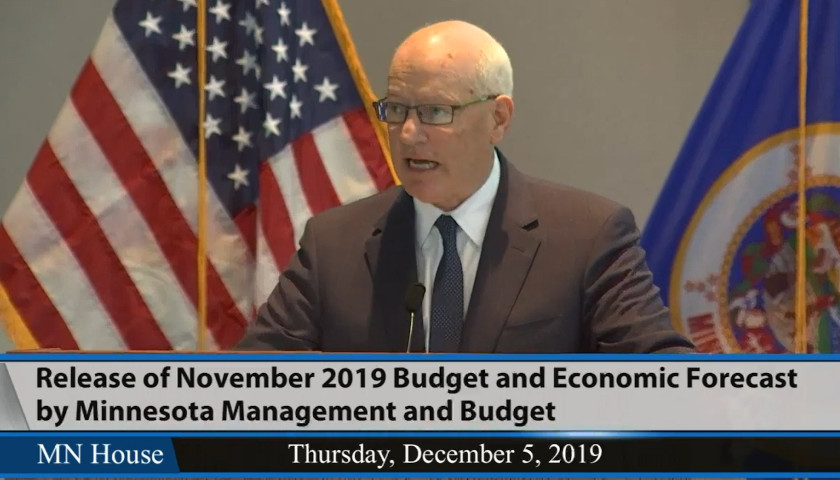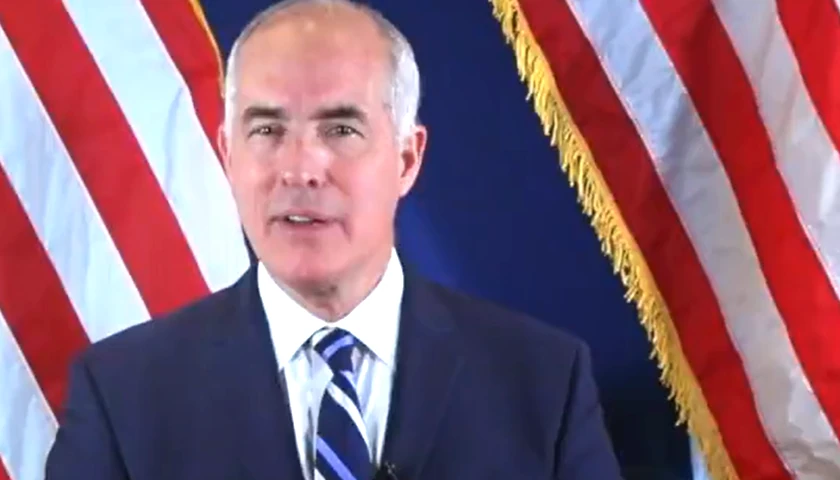An economic forecast released Thursday predicts Minnesota will have a budget surplus of $1.3 billion for the 2020-21 biennium, setting up debates between state lawmakers about what their budgeting priorities will be when they return for session in February.
Minnesota Management and Budget (MMB) said a small decrease to estimated spending and an improved revenue forecast have created an estimated surplus of $1.332 billion. Specifically, officials estimated a $493 million increase in income tax revenue over the previous forecast, a $252 million increase in general sales tax revenue, and a $294 million decrease in corporate tax revenue.
The forecast is the first of two reports lawmakers will use to guide their budgeting decisions during the 2020 session. A previous forecast had projected a $1.05 billion surplus for the current biennium, which runs through June 2021.
Budget officials said an extra $284 million has been added to the state’s budget reserve, which now has an account balance of $2.36 billion.
“This forecast is an indication of Minnesota’s strong economic fundamentals,” MMB Commissioner Myron Frans claimed during a Thursday press conference, saying the strong status of Minnesota’s rainy day fund is “especially good news.”
“But I would not be a thoughtful budget commissioner if I failed to mention that we need to be careful in planning and our decision making to ensure that we maintain budget stability going forward,” he added.
The budget forecast prompted a flurry of reactions from state lawmakers, many of whom disagreed with Frans’ positive assessment.
“Commissioner Frans presented today’s forecast announcement as ‘good fiscal management.’ Nothing could be further from the truth,” said Rep. Steve Drazkowski (R-Mazeppa) in a press release. “State government spending and budget reserves are both at the highest levels in history. Government is over-collecting money from workers and then squandering it on wasteful and fraudulent DHS spending. It’s time to shut off the money-sucking machine connected to the wallets and purses of hard-working Minnesotans.”
Rep. Tim Miller (R-Prinsburg), Drazkowski’s colleague in the New House Republican Caucus, said Minnesotans are “overtaxed” and “fed up.”
“When I hear the word surplus with a government revenue forecast, my mind immediately goes to what that money could have done in our communities, for businesses, and Minnesota families, if they had been allowed to keep their own money,” he added.
Rep. Cal Bahr (R-East Bethel) said Gov. Tim Walz is “obsessed with maxing out the state credit card.”
“If there is a structural surplus and an enormous amount in the rainy-day fund, we should be paying cash for capital projects and paying down our current debt,” said Bahr.
Rep. Jeremy Munson (R-Lake Crystal) said Minnesotans are finally reaping the benefits of President Donald Trump’s tax reforms while House Minority Leader Kurt Daudt (R-Crown) criticized Democratic lawmakers for raising the cost of health care by $900 million per year during the previous session.
“This surplus is enough to fully repeal Democrats’ harmful health care tax hike and lower health care costs. With our budget reserve fully-funded and revenues continuing to grow thanks to Republican-led tax cuts, we have an opportunity to reduce health care costs for Minnesotans by nearly a billion dollars,” he said.
House Majority Leader Ryan Winkler (D-Golden Valley) said the budget forecast “shows challenges for Minnesota, including deficits in future years.” Winkler suggested that the “surplus story is fiction” because it doesn’t “count the increased costs of providing these core services.”
Assistant Senate Minority Leader Susan Kent (D-Woodbury) pointed out that the “budget balance ignores inflation.”
“Without thoughtful investments in what Minnesotans deserve, we’ll jeopardize the things DFLers have worked so hard to build,” she added.
Senate Majority Leader Paul Gazelka (R-Nisswa) said the “savings account is full, and it’s time to give it back.”
“This surplus needs to be approached with fiscal responsibility and accountability to the taxpayer – this is their money after all,” he continued, saying Senate Republicans will look at exempting senior citizens from paying taxes on their social security, providing relief to farmers, and providing income rate cuts for families.
“We also want to look at one-time options like: tab fee decreases, school safety improvements, cash for roads and bridges, and keep our borrowing through a bonding bill low in light of the extra cash on hand,” he added.
A second budget forecast will be released at the end of February after lawmakers return for session on February 11.
– – –
Anthony Gockowski is managing editor of Battleground State News, The Ohio Star, and The Minnesota Sun. Follow Anthony on Twitter. Email tips to [email protected].





[…] Management and Budget (MMB) released an economic forecast in November that predicts Minnesota will have a budget surplus of $1.3 billion for the 2020-21 […]
[…] Management and Budget (MMB) released an economic forecast in November that predicts Minnesota will have a budget surplus of $1.3 billion for the 2020-21 […]